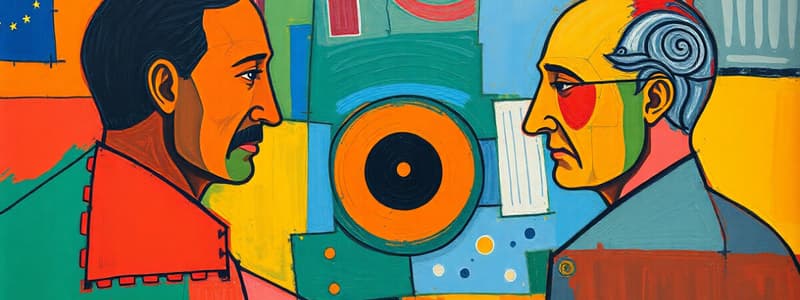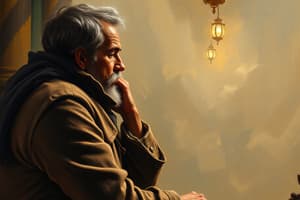Podcast
Questions and Answers
What does John Mearsheimer argue about states in the international system?
What does John Mearsheimer argue about states in the international system?
- States avoid pursuing hegemony.
- States are primarily motivated by moral considerations.
- States are inherently power-maximizers. (correct)
- States act primarily to foster cooperation.
Which factor distinguishes neoclassical realism from other theories?
Which factor distinguishes neoclassical realism from other theories?
- Emphasizes individual leaders' ethics.
- Exclusively focuses on international institutions.
- Assumes that all states are revisionist.
- Incorporates both structural and unit-level factors. (correct)
What is Robert Keohane known for in the context of international relations?
What is Robert Keohane known for in the context of international relations?
- Exploring the ethical dimensions of state behavior.
- Developing the concept of international anarchy.
- Stressing the importance of institutions for cooperation. (correct)
- Examining the role of power in conflict.
In constructivism, what does Alexander Wendt mean by 'anarchy is what states make of it'?
In constructivism, what does Alexander Wendt mean by 'anarchy is what states make of it'?
Which scholar contributed to the neo-neo debate in international relations?
Which scholar contributed to the neo-neo debate in international relations?
What concept is central to Hedley Bull's work in the English School?
What concept is central to Hedley Bull's work in the English School?
Which contribution is Martin Wight known for in international relations theory?
Which contribution is Martin Wight known for in international relations theory?
Randall Schweller's work on neoclassical realism primarily focuses on which distinction?
Randall Schweller's work on neoclassical realism primarily focuses on which distinction?
What does neoclassical realism emphasize in the context of foreign policy decisions?
What does neoclassical realism emphasize in the context of foreign policy decisions?
How does neoliberalism differ from realism in terms of state interactions?
How does neoliberalism differ from realism in terms of state interactions?
What role do international organizations play according to constructivists?
What role do international organizations play according to constructivists?
What aspect of international relations does the English School primarily focus on?
What aspect of international relations does the English School primarily focus on?
In Marxism, what is considered the key driver shaping global dynamics?
In Marxism, what is considered the key driver shaping global dynamics?
Which of the following is a primary focus of neo-Gramscianism?
Which of the following is a primary focus of neo-Gramscianism?
How do constructivists view the influence of transnational advocacy networks?
How do constructivists view the influence of transnational advocacy networks?
What is one emerging recognition within the English School regarding non-state actors?
What is one emerging recognition within the English School regarding non-state actors?
What do classical realists argue about universal moral principles?
What do classical realists argue about universal moral principles?
What concept does neorealism emphasize as the primary determinant of state behavior?
What concept does neorealism emphasize as the primary determinant of state behavior?
Which of the following best describes the 'security dilemma'?
Which of the following best describes the 'security dilemma'?
What main factor do neorealists believe determines the likelihood of conflict and cooperation in the international system?
What main factor do neorealists believe determines the likelihood of conflict and cooperation in the international system?
In the debate between offensive and defensive realism, what do defensive realists advocate for?
In the debate between offensive and defensive realism, what do defensive realists advocate for?
What aspect does neoclassical realism seek to incorporate along with structural factors?
What aspect does neoclassical realism seek to incorporate along with structural factors?
Why can varying perceptions of power distribution lead to conflict, according to neoclassical realism?
Why can varying perceptions of power distribution lead to conflict, according to neoclassical realism?
How does state capacity influence a state's behavior on the international stage, according to neoclassical realism?
How does state capacity influence a state's behavior on the international stage, according to neoclassical realism?
What is the core-periphery hierarchy in world-systems theory primarily characterized by?
What is the core-periphery hierarchy in world-systems theory primarily characterized by?
How do feminist theories in international relations view gender?
How do feminist theories in international relations view gender?
What aspect of capitalism do world-systems theorists analyze historically?
What aspect of capitalism do world-systems theorists analyze historically?
What do feminist scholars critique about traditional international relations concepts?
What do feminist scholars critique about traditional international relations concepts?
What does intersectional analysis in feminist IR recognize?
What does intersectional analysis in feminist IR recognize?
What do postcolonial and decolonial approaches emphasize about colonialism?
What do postcolonial and decolonial approaches emphasize about colonialism?
What is a characteristic of Eurocentric perspectives in traditional international relations?
What is a characteristic of Eurocentric perspectives in traditional international relations?
What role does capitalism play according to world-systems theory?
What role does capitalism play according to world-systems theory?
What is the primary motivation for states in classical realism?
What is the primary motivation for states in classical realism?
What does the concept of 'self-help' imply in the context of classical realism?
What does the concept of 'self-help' imply in the context of classical realism?
In neorealism, what is considered the primary determinant of state behavior?
In neorealism, what is considered the primary determinant of state behavior?
What does the security dilemma refer to in neorealism?
What does the security dilemma refer to in neorealism?
How does neoclassical realism differ from classical realism?
How does neoclassical realism differ from classical realism?
What is meant by 'status quo states' in neoclassical realism?
What is meant by 'status quo states' in neoclassical realism?
What does the term 'dual moral standard' refer to in classical realism?
What does the term 'dual moral standard' refer to in classical realism?
In neorealism, what factor greatly influences the likelihood of conflict or cooperation between states?
In neorealism, what factor greatly influences the likelihood of conflict or cooperation between states?
Study Notes
Classical Realism
- Emphasizes the anarchic nature of the international system, where states are the primary actors.
- States are motivated by the pursuit of power and security, making survival their ultimate goal.
- Self-help is a key principle, meaning states need to rely on their own capabilities for security and cannot depend on others.
- Raison d'État (the national interest) guides state decisions, often prioritized over other considerations.
- A dual moral standard applies: One for individuals and another for states in international relations.
Neorealism (Structural Realism)
- Shifts focus from human nature to the international system's structure as the primary determinant of state behavior.
- The anarchic structure of the international system leads to a security dilemma, where actions taken to enhance security can threaten others.
- The distribution of power influences international relations, with different power structures (e.g., unipolar, bipolar, multipolar) shaping dynamics.
Neoclassical Realism
- Incorporates domestic factors, such as state-society relations and leaders' perceptions, into its analysis of state behavior.
- Emphasizes the role of leaders' perceptions and interpretations of the international system and power distribution.
- Distinguishes between status quo states (satisfied with the existing order) and revisionist states (seeking to change it).
Neoliberalism
- Focuses on the role of institutions in promoting cooperation among states and mitigating the effects of anarchy.
- Emphasizes the potential for cooperation among states, particularly through international organizations.
Constructivism
- Argues that anarchy is what states make of it, highlighting the role of ideas, norms, and identities in shaping international relations.
- Recognizes the influence of both states and non-state actors, including international organizations and transnational advocacy networks, in shaping norms and behaviors.
The English School
- Emphasizes the concept of international society, the balance between order and justice, and a historical and interpretive approach to IR.
- Focuses on states as the core actors in international society and their role in constructing and shaping norms and institutions.
- Acknowledges the growing need to incorporate non-state actors as they become more influential in functionally differentiated international societies.
World-Systems Theory
- Argues that the capitalist world economy is structured as a hierarchy with a core, periphery, and semi-periphery characterized by an exploitative relationship.
- Emphasizes unequal development, where the core often benefits at the expense of the periphery.
- Views capitalism as a historical system with a beginning, middle, and end, with globalization seen as a continuation of capitalist expansion.
Feminist IR
- Challenges the assumption that gender is a biological given, arguing it's a social construct that shapes power relations, identities, and experiences.
- Explores how gendered power relations operate in international politics, influencing state behavior, global governance, and resource distribution.
- Uses intersectional analysis, recognizing the intersection of gender with race, class, and sexuality in shaping experiences of inequality and oppression.
- Critiques traditional IR concepts, such as the state, security, and sovereignty, as often gendered and reflecting masculine perspectives.
- Encompasses various theoretical perspectives, including liberal feminism, critical feminism, poststructural feminism, and postcolonial feminism, providing diverse insights.
Postcolonialism/Decolonialism
- Emphasizes the enduring legacies of colonialism and imperialism in shaping global power relations, knowledge production, and international institutions.
- Challenges Eurocentric perspectives and advocates for centering the experiences and perspectives of marginalized groups in the Global South.
- Examines the relationship between the colonial past and the present, including how colonial attitudes persist in international relations.
Studying That Suits You
Use AI to generate personalized quizzes and flashcards to suit your learning preferences.
Related Documents
Description
Explore the foundational theories of Classical Realism and Neorealism, emphasizing the anarchic nature of the international system and the behavior of states. Understand how power, security, and the state's national interest shape international relations and guide decision-making.




